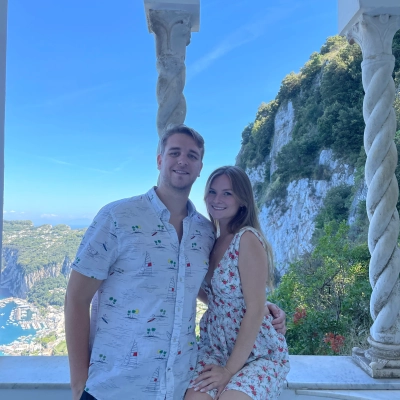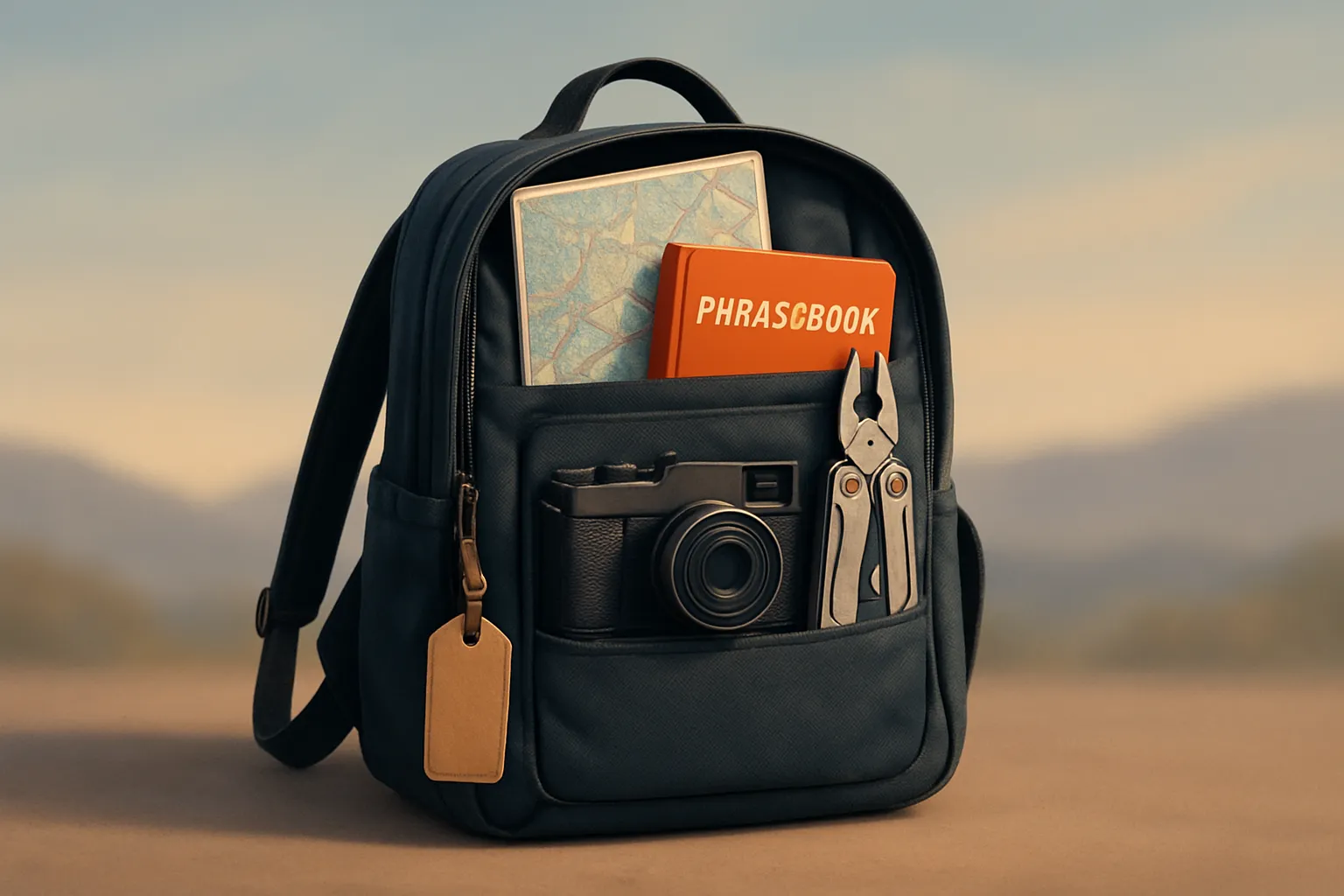Travel Hacks: Essential Skills From Seasoned Globetrotters
Discover the secrets of seasoned travelers and transform your journeys with expert-approved travel hacks. This guide offers practical wisdom on everything from packing efficiently to immersing in local cultures. Whether you’re a novice explorer or a frequent flyer, these insights will help you make the most of your adventures abroad.
- Embrace Spending for Unforgettable Experiences
- Immerse in Local Culture for Richer Journeys
- Master Budget Travel for More Adventures
- Travel Light to Enhance Your Experience
- Navigate Public Transit for Authentic Exploration
- Partner with Travel Agents for Complex Itineraries
- Prepare Digital Backups to Prevent Travel Disasters
- Lower Expectations to Appreciate Cultural Differences
- Find Hidden Gems Through Genuine Reviews
- Create Micro-Itineraries for Spontaneous Adventures
- Use Translation Tech to Bridge Language Barriers
- Adopt Modular Packing for Stress-Free Travel
- Learn Basic Phrases to Connect with Locals
- Embrace Solo Activities for Personal Growth
- Master Offline Maps for Independent Exploration
- Adapt Quickly to New Environments Abroad
- Stay Flexible for Unexpected Travel Moments
Embrace Spending for Unforgettable Experiences
Spending money is an underrated skill to have. There were too many times early in our travels when we tried so hard to be budget travelers. That included skipping out on activities, not valuing the local cuisine, and spending time on longer transportation to save a few extra dollars. I missed out on paragliding over Fethiye, going up in the balloons in Cappadocia, and not tasting some of the most delicious food in the world. If I could do it all over again, I would have spent less money when I was employed at my job, saved up more, and then not hesitated when looking at some of the most amazing activities that we missed out on. Over the years, I’ve learned to fully experience the country I’m traveling to and spend more money on the experiences that truly make me happy!
 Cullen Boone
Cullen Boone
Travel Blogger, Passport Pilgrimage
Immerse in Local Culture for Richer Journeys
One travel-related skill I’ve developed over the years is the ability to truly immerse myself in local cultures rather than simply being a tourist. I make it a point to visit local markets, try authentic regional foods, and attend cultural festivals whenever possible. Building connections with local residents has proven invaluable, as these interactions provide insights that guidebooks simply cannot offer. These relationships have opened doors to unique experiences, from discovering hidden restaurants to participating in traditional ceremonies that most visitors never see. The friendships formed during my travels have not only enriched my personal journeys but have also broadened my professional perspective by exposing me to diverse viewpoints and approaches to business.
 Billy Rhyne
Billy Rhyne
CEO & Founder | Entrepreneur, Travel Expert | Land Developer and Merchant Builder, Horseshoe Ridge RV Resort
Master Budget Travel for More Adventures
One travel skill that I have developed is becoming a master at scouring for cheap travel deals and being able to travel on a budget effectively, which means even more trips! From utilizing credit card and airline points, looking at breaking up flights to visit more destinations and get cheaper airfares, to realizing that sometimes using a travel agent is the cheapest option, I have mastered the art of budget travel. Over the years, this skill has helped my husband and me travel so much more!
Amy Forret
Travel Blogger & Travel Agent, Plain2Plane
Travel Light to Enhance Your Experience
My best travel skill is having mastered the art of relying on one bag, and it’s the one that has served me the best. At the carousel, I can keep walking because that one bag is enough for me. I carry a small cabin bag with a rolled shirt on top so I can land, change, and move. Fewer extras mean fewer choices to slow me down; I’m more likely to make that last ferry and less likely to fret about missing gear. The knock-on effect is real in daily life too, from how I set budgets to how I keep my desk clear. Travel light and the day opens up — you notice more, you decide faster, and you don’t miss the stuff you left out.
When you’ve stripped away the non-essentials, what you create is headspace for what matters both on the road and in the office.
 Bryce Collins
Bryce Collins
Marketing Director, INTRO
Navigate Public Transit for Authentic Exploration
One travel-related skill I’ve developed is learning to read local transit maps quickly and intuitively. Early on, I relied heavily on rideshares and taxis, which was expensive and limited my flexibility. Over time, I started analyzing subway lines, bus routes, and transfer points before arriving in a city, sometimes even practicing the routes on apps like Google Maps. This skill has saved me hours and reduced stress in unfamiliar cities like Tokyo or Berlin. Beyond efficiency, it allowed me to explore neighborhoods I wouldn’t have visited otherwise, discover local cafes, and interact with residents more naturally. I’ve also found that being confident in navigating public transit opens opportunities for spontaneous adventures, like taking a last-minute train to a nearby town. Overall, mastering this skill has made my travel experiences more independent, immersive, and rewarding.
 Nikita Sherbina
Nikita Sherbina
Co-Founder & CEO, AIScreen
Partner with Travel Agents for Complex Itineraries
One travel-related skill I’ve developed that has proven invaluable is knowing when to partner with a professional travel agent for complex itineraries. When planning multi-country trips with specific timing requirements and custom accommodations, I’ve found that working with an experienced agent saves countless hours of research and coordination. I view these professionals as trip “producers” who can balance my vision with practical logistics, managing on-ground scheduling and serving as advocates when travel issues inevitably arise. This approach has significantly enhanced my travel experiences by reducing planning stress and allowing me to focus on the destination rather than the details. The peace of mind that comes from having a knowledgeable advocate has made my more ambitious travel plans both possible and enjoyable.
 Kristina Bronitsky
Kristina Bronitsky
Director of Consumer Marketing, RedAwning
Prepare Digital Backups to Prevent Travel Disasters
Before any trip, I create multiple backup layers of all critical travel data—flight confirmations, hotel reservations, insurance documents, passport scans, and itineraries. I store these across cloud services, physical devices, and even offline formats. More importantly, I’ve learned to anticipate digital disasters: corrupted files on memory cards, crashed phones with boarding passes, or lost laptops containing presentation materials for business trips.
This skill has saved countless travel experiences. During a business trip to Tokyo, my phone died completely the night before an important client presentation. While other travelers might panic, I immediately accessed my backup presentation files from a secondary device and had alternative contact methods ready. On a family vacation in Europe, when my daughter’s phone corrupted all her photos from the first week, I was able to recover most of them using portable data recovery tools I now always pack.
The data recovery mindset has taught me that travel disasters are rarely “if” scenarios—they’re “when” scenarios. By thinking like a data recovery specialist, I approach travel with redundancy planning that goes far beyond typical travel insurance. This preparation has transformed potentially trip-ruining moments into minor inconveniences, allowing me to focus on what matters: the actual travel experience.
 Robert Chen
Robert Chen
VP & CIO, DataNumen
Lower Expectations to Appreciate Cultural Differences
One travel-related skill I’ve developed is lowering my expectations. It may sound cynical, but it helps me to truly enjoy the experience for what it is and not get upset if something doesn’t go my way. I’ve noticed, especially with Americans, that they often travel abroad with the expectation that all the comfortable amenities they have back home are available everywhere else. If you go into traveling with an ethnocentric mindset, you’re bound to be disappointed.
When you release yourself from these standards, you’re able to focus on how the cultural differences make up the city you’re in. Instead of focusing on how there are no Ubers, you can realize how walkable the city is and how much more you are able to see than if you drove everywhere.
The things we often view as inconveniences could actually be one of the main selling points of why locals want to live there. Appreciating the little nuances helps you to view life in a different way. It’s also fun to talk to locals and exchange cultural differences.
And isn’t that why we want to travel anyway? To see how different cultures live? If you want to go on a trip and have all the same amenities as in your home country, then that’s called a vacation.
Traveling is about immersing yourself in another culture and trying new things.
Not having an ethnocentric view when traveling also shows respect to locals. Imagine going to someone’s home and criticizing everything that is ‘abnormal’ to you; I can guarantee you won’t be invited over again.
 Ana O’Neill
Ana O’Neill
Account Executive, Featured
Find Hidden Gems Through Genuine Reviews
One skill that has served me well is the ability to find great restaurants using Google Maps. When searching for restaurants, I don’t just look for places with high ratings – I have a system where I read through reviews for genuine enthusiasm. Some of the best restaurants I’ve tried in my travels had very few reviews or subpar scores (like a 4.3), but what I’m looking for is places where people are almost struggling to capture how great the place is. Think: “This place was the best place we ate on our trip, we went back several times, and I’ve been dreaming of the eggplant dish since we got home” instead of “Everything was great, highly recommend.” The more specific the review, the more likely people enjoyed it enough to want to vouch for it.
Amber Haggerty
Travel Blogger, Amber Everywhere
Create Micro-Itineraries for Spontaneous Adventures
Over the years, I’ve mastered the art of building micro-itineraries on the go, short, flexible travel plans that let me make the most of even a two-hour gap between meetings. As a founder managing Estorytellers and traveling for client meetings or literary events, I rarely get long vacations, but this skill helps me turn work trips into mini-adventures.
It’s made my travel experiences richer because I can immerse myself in local culture without feeling rushed, whether it’s sneaking in a quick museum visit, trying a hidden street food spot, or attending a local book reading. It keeps me refreshed, sparks creativity, and often gives me unexpected business inspirations.
 Kritika Kanodia
Kritika Kanodia
CEO, Estorytellers
Use Translation Tech to Bridge Language Barriers
Learning to effectively use translation technology has been one of my most valuable travel skills. I now rely on Google Translate as my personal translator when visiting countries where I don’t speak the language. This tool has transformed how I interact with local communities, allowing me to read menus, understand signs, and have basic conversations with people I meet during my travels. The ability to bridge language barriers has opened doors to authentic experiences that would otherwise remain inaccessible to tourists who stick to English-only interactions. What started as a simple travel hack has become an essential skill that makes each international trip more rewarding and less stressful.
 Alex Cornici
Alex Cornici
Marketing & PR Coordinator, Flow Digital
Adopt Modular Packing for Stress-Free Travel
Learning how to pack with a modular system has proven indispensable. Using packing cubes organized by clothing type or activity not only saves space but also eliminates the stress of rummaging through a suitcase. For example, one cube holds workout gear, another holds evening wear, and another contains daily essentials. This method keeps items accessible and makes transitions between destinations smoother, especially on multi-city trips.
The benefit extends beyond efficiency. With less time spent searching for things, more energy is available to focus on the actual travel experience. It also prevents overpacking, since seeing each cube laid out before departure provides a clear inventory. The discipline of modular packing has turned travel from a logistical challenge into a more seamless and enjoyable process.
 Belle Florendo
Belle Florendo
Marketing Coordinator, RGV Direct Care
Learn Basic Phrases to Connect with Locals
One travel-related skill I’ve developed that’s been invaluable is learning basic phrases in the local language wherever I go. Even just simple words like “hello,” “thank you,” or “how much” can completely change the tone of an interaction.
This skill has enhanced my travels by opening doors to more genuine connections with locals. People are usually more welcoming when they see you making an effort, and I’ve been offered recommendations, insider tips, and even spontaneous invitations just because I tried to speak their language. It also makes navigating daily situations, like ordering food or asking for directions, much smoother and less stressful.
It’s a small effort with a big impact, and it’s taught me that respect and curiosity go a long way in building memorable travel experiences.
 Xin Zhang
Xin Zhang
Marketing Director, Guyker
Embrace Solo Activities for Personal Growth
Learning to be comfortable with solo activities while traveling has been an invaluable skill in my journey. Initially, simple things like dining alone felt intimidating, but pushing through that discomfort helped me develop a level of confidence and independence I wouldn’t have gained otherwise. This newfound comfort with solitude has completely transformed how I approach travel, allowing me to be more spontaneous and self-reliant. The benefits have extended beyond my travels, positively influencing how I approach solo activities in my everyday life as well.
 Jen Carmichael
Jen Carmichael
Co-Founder & Managing Partner, My Front Porch
Master Offline Maps for Independent Exploration
Learning how to navigate with offline maps has been an invaluable travel skill. Downloading detailed maps in advance eliminates dependence on Wi-Fi or mobile data, which is often unreliable or expensive abroad. It also makes it possible to explore less tourist-heavy areas with confidence, since routes, transit options, and even local landmarks remain accessible without a connection.
The impact has been significant. Instead of feeling restricted to areas with strong service, I can move freely and make spontaneous decisions, whether it is walking through side streets or venturing into rural locations. This independence has led to more authentic experiences and reduced stress when signals drop. The skill has turned travel from a series of planned checkpoints into a more flexible and rewarding journey.
 Ydette Florendo
Ydette Florendo
Marketing Coordinator, A-S Medical Solutions
Adapt Quickly to New Environments Abroad
Adjusting quickly to a new environment. I traveled to over 50 countries of the world, and after a certain time, I was able to get accustomed to the new situation quickly. Get a new SIM card, change money in countries needed, and get a map or good feeling of your surroundings. With this skill I lose less time and make fewer mistakes in a new country/situation, like overpaying for stuff or getting scammed. Watching videos and 1-2 guides before traveling to the new country also helps. Overall, I have the feeling I can see more of the countries, and the overall experience feels less stressful.
 Heinz Klemann
Heinz Klemann
Senior Marketing Consultant, BeastBI GmbH
Stay Flexible for Unexpected Travel Moments
Flexibility has saved more trips than any amount of planning ever could. Flights get delayed, weather changes, restaurants close early… rolling with it instead of stressing keeps the trip fun. It’s also led to some of my favorite unexpected moments, like finding a hole-in-the-wall café after a last-minute change in plans. Being flexible turns “problems” into stories!
 Rachael Mueller
Rachael Mueller
Fractional COO, Hey Rachael Consulting




